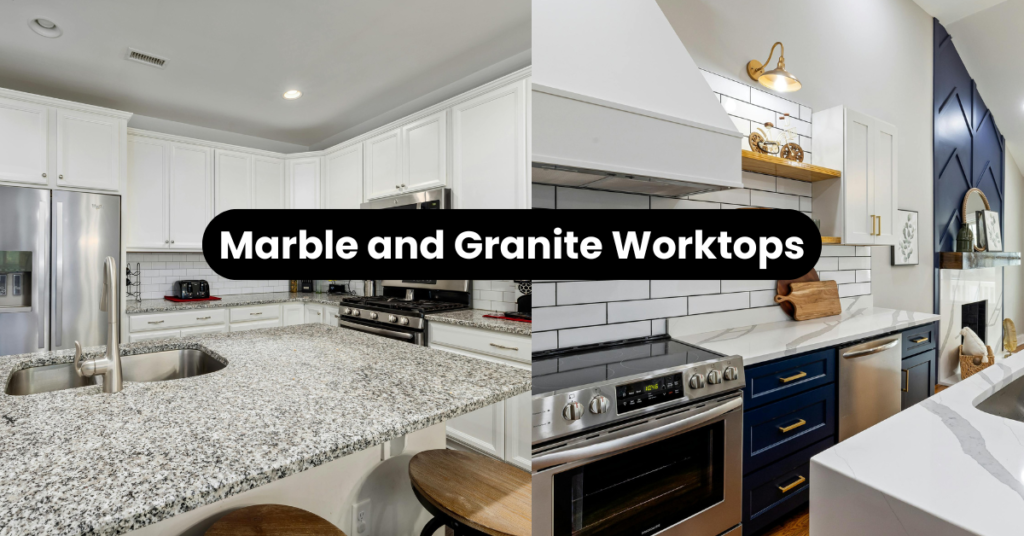Choosing ideal worktops for your kitchen is a must. This will affect both the functioning and aesthetic of the room. An aesthetically appealing kitchen worktop enhances your design and, more importantly, affects the longevity of your space. Homeowners looking to spruce up the elegance of their kitchen usually settle for marble and granite worktops. Both materials are naturally stone surfaces and known for their beauty. However, they each have unique characteristics which make them more suitable for certain lifestyles. You should understand the differences that exist between granite or marble worktops. These include their appearance, durability costs and practicality.
This guide presents a detailed comparison of the two materials. The comparison will help to determine which one is best for you.
Marble and Granite Worktops difference
Homeowners choose marble and granite worktops because of their ability to improve the look of kitchens. While both materials provide a natural, luxurious look, their colour and pattern variations are quite distinct.
Marquise: Classic Elegance Featuring Unique Veining
The word marble is often used to describe luxury. The distinct veining pattern gives marble a refined and timeless appeal. The veins on marble worktops are a natural formation and they flow over the surface. This gives it a polished appearance.
- The most popular colours are cream, light grey, and white.
- Each slab of stone is unique. No two worktops have the exact same look.
- The natural veining in granite worktops makes it a standout piece in any modern kitchen.
Granite, a bold, textured, and versatile material
Granite has a more coarse texture and contains mineral speckles, such as mica, feldspars, and quartz. Granite has a granular, dynamic look as opposed to marble’s flowing lines.
- Available in a wide range of colours. These colours include black and red, as well as blue, brown and green .
- Granite is a natural stone that contains mineral deposits. These deposits give the granite a speckled and multi-tonal look. They add character to its surface.
- This pattern is compatible with both traditional and contemporary kitchen designs .
Marble is an excellent choice if you prefer a polished, sophisticated finish with fine veining. If you’re looking for a natural look with vibrant colours and a textured texture, granite will be the better choice.
2. Durability of Worktops: Which is more resistant
Durability plays a big role in choosing between Marble and Granite worktops. Worktops in the kitchen should be durable enough to withstand everyday use, spills or heat exposure.
Hard, Heat-Tolerant Granite
Granite is an igneous rock. It was formed through high pressure and temperature, making it among the hardest natural materials. It offers:
- Outstanding scratch resistance. It can handle heavy cookware and sharp knives without being damaged.
- High heat tolerance You can place hot pots and pans directly onto a granite countertop without worry of burns or discolouration.
- High porosity When sealed properly, Granite resists stains.
Marble is Durable but Porous
It is softer than granite. It’s fine texture makes it more vulnerable to:
- Scratches and Chips: Sharp knives, heavy materials, and abrasive surfaces can all cause damage.
- Etching in acidic substances: Lemon juice, vinegar, and wine can leave marks, if cleaned promptly.
- Spots and discolouration: marble is porous, so liquids can seep through. This causes permanent stains.
Granite is the ideal choice if you require a high-quality, low-maintenance surface. But if you’re ready to do the extra work, marble can be a substantial investment.
Maintenance and Cleaning – Which Worktops are Easier
Low-Maintenance Granite: Easy to Clean
Granite is fairly easy to care for. You only need to seal it about once every two to three years. Cleaning granite is simple:
- If you’re looking to clean the surface, a gentle soap with warm water is best.
- Do not utilise aggressive cleaning products or acidic types of cleaners as they will wear the sealant thinner.
- Because granite is less porous than marble, the spills should be taken care of right away.
The Marble Surface Needs More Frequent Maintenance
Its porosity makes marble prone to stains without sealant being applied every 6-12 months. Follow these maintenance suggestions for better upkeep:
- Avoid acidic materials that can cause dulling and etching.
- Use a cleaner that is pH-neutral to protect the surface.
- It is important to clean up spills promptly to prevent permanent staining.
Granite is better for the low-maintenance homeowner as it requires less maintenance. Marble requires regular sealing and care. However, it rewards homeowners with timeless appeal.
Which Worktop is cheaper
Granite is typically more affordable than stone, although prices vary based on colour, rarity, thickness. Even high-end marble slabs tend to cost less than granite. In contrast, marble is a luxurious investment. Some premium varieties, such as Carrara and Calacatta stone, command significantly higher price tags, and have higher maintenance costs.
Granite is more cost effective and offers greater value for homeowners. Marble is a luxury investment. This material is best suited for people who are willing to pay more to get its elegance.
Conclusion
Choose a reliable supplier to ensure you get high-quality materials. Imperial Worktops offer a variety of high quality marble and granite worktops from the finest quarries. They have the expertise to cut, finish, and install each worktop according to high standards. Imperial Worktops offer a wide range of options for kitchen worktops, including granite and marble.
(FAQs).
1. Is marble or granite better for the worktop of a modern kitchen?
Granite is better suited for busy kitchens thanks to its durability and low-maintenance . Meanwhile, marble is best suited for elegant kitchens.
2. How often are marble and granite worktops sealed?
- One to two years. Seal the Granite.
- Marble is sealed once every six to twelve months.
3. Are marble or granite worktops resistant to heat?
Yes, both materials will handle heat. However, stone has a much higher heat tolerance.
4. How quickly does marble stain?
Yes, marble absorbs spills and stains quickly if it is not immediately cleaned.
5. Can I use a diamond blade to cut directly into a granite, marble or other worktop surface?
The knives will scratch your marble and make the granite look dull. Always use chopping boards.
6. Which worktop will provide better value in the long run?
Granite is the most cost-effective material in the long term. This is due to how durable it can be and its low maintenance costs.

